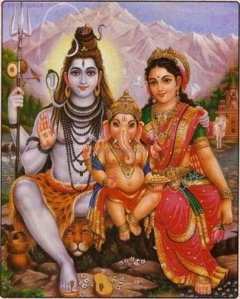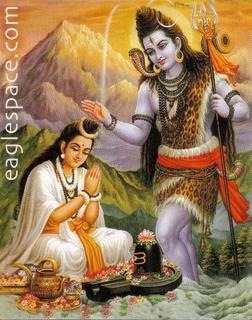Maha Shivratri – Celebrating Lord Shiva
Maha Shivratri is celebrated in honor of Lord Shiva on the final night of the Krishna paksha (dark half or waning phase) of the moon (night before Amavasya) in the month of Phalgun (Feb-March) by almost all sects within Hinduism. It is a day of fasting for all devotees of Lord Shiva and is one of the eight most significant days of fasting in the Hindu Calendar.
As Lord Shiva is considered to be the lord of meditation and penance, devotees may be best served by engaging in introspection and self-evaluation of their spiritual progress on Maha Shivratri. Hence, this day may be considered as an opportunity to engage in awakening one’s inner spirit towards (self)-realization of the supreme. It is perhaps for this reason that the scriptures encourage us to remain awake throughout the night on Shivratri – to welcome the new moon and its spiritual energy into our lives.
Origin of Maha Shivratri
When creation had been completed, Shiva and Parvati went out to live on the top of Mount Kailas. Parvati asked, “O venerable Lord! which of the many rituals observed in Thy honour doth please Thee most?” The Lord replied, “The 14th night of the new moon, in the dark fortnight during the month of Phalgun, is my most favourite day. It is known as Shivaratri. My devotees give me greater happiness by mere fasting than by ceremonial baths and offerings of flowers, sweets and incense.
Shiva and Parvati with Ganesha
“The devotee observes strict spiritual discipline in the day and worships Me in four different forms during each of the four successive three-hour periods of the night. The offering of a few bael leaves is more precious to Me than the precious jewels and flowers. My devotee should bathe Me in milk at the first period, in curd at the second, in clarified butter at the third, and in honey at the fourth and last. Next morning, he should feed the Brahmins first and, after performing the prescribed ceremonies, he can break his fast. O Parvati! there is no ritual which can compare with this simple routine in sanctity.”
Parvati was deeply impressed by the speech of Lord Shiva. She repeated it to Her friends who in their turn passed it on to the ruling princes on earth. Thus was the sanctity of Shivaratri broadcast all over the world.
The Story of King Chitrabhanu
(source: Swami Sivananda)
Once upon a time King Chitrabhanu of the Ikshvaku dynasty, was observing a fast with his wife, it being the day of Maha Shivaratri. The sage Ashtavakra came on a visit to the court of the king. The sage asked, “O king! why are you observing a fast today?”
The king said to the sage: In my past birth I was a hunter in Varanasi. My name was Suswara. My livelihood was to kill and sell birds and animals. One day I was roaming the forests in search of animals. I was overtaken by the darkness of night. Unable to return home, I climbed a tree for shelter. It happened to be a bael tree. I had shot a deer that day but I had no time to take it home. I bundled it up and tied it to a branch on the tree.
As I was tormented by hunger and thirst, I kept awake throughout the night. I shed profuse tears when I thought of my poor wife and children who were starving and anxiously awaiting my return. To pass away the time that night I engaged myself in plucking the bael leaves and dropping them down onto the ground.
The day dawned. I returned home and sold the deer. I bought some food for myself and for my family. I was about to break my fast when a stranger came to me, begging for food. I served him first and then took my food.
At the time of death, I saw two messengers of Lord Shiva. They were sent down to conduct my soul to the abode of Lord Shiva. I learnt then for the first time of the great merit I had earned by the unconscious worship of Lord Shiva during the night of Shivaratri. They told me that there was a Lingam at the bottom of the tree. The bael leaves I dropped fell on the Lingam. My tears which I had shed out of pure sorrow for my family fell onto the Lingam and washed it. And I had fasted all day and all night. Thus did I unconsciously worship the Lord Shiva on Shivratri and attained moksha.
Spiritual Cleansing during Maha Shivratri
Shiva and Parvati
No worship is complete without offering something to the deity. Shiva is a very simple lord, he is innocent – bholanath. One just needs to offer bel-patra (bilva leaf) to him. But in this simplicity is a deep message. Bel-patra offerings signify the surrender of all three aspects of one’s nature – Tamas, Rajas and Sattva. You have to surrender the positives and negatives of your life to Shiva and become carefree! The greatest offering is your self.
According to Swami Sivananda, the two great natural forces that afflict man are Rajas (the quality of passionate activity) and Tamas (that of inertia). Continuous worship of the Lord necessitates the devotee’s constant presence in the place of worship. Evils like lust, anger, and jealousy, born of Rajas are ignored and subdued. The devotee observes vigil throughout the night and thus conquers Tamas also. Constant vigilance is imposed on the mind.
According to Sri Sri Ravi Shankar, to offer one’s self is the key to happiness in life. Afterall, why do you get sad? It is mainly because you are not able to achieve something in life. At such times you should surrender everything to the all knowing God. The greatest power is in surrender to the divine. It’s like a drop owning the ocean. If a drop remains separate, it will perish. But when it becomes the ocean, it is eternal!
The formal worship consists of bathing the Lord. Lord Shiva is considered to be the Form of Light (which the Shiva Lingam represents). He is burning with the fire of austerity. He is therefore best propitiated with cool bathing. While bathing the Lingam the devotee prays: “O Lord! I will bathe Thee with water, milk, etc. Do Thou kindly bathe me with the milk of wisdom. Do Thou kindly wash me of all my sins, so that the fire of worldliness which is scorching me may be put out once for all, so that I may be one with Thee-the One alone without a second.”
The two mantras that are perhaps most relevant to invoking the power and energy associated with Lord Shiva are:
- the simple, five-syllable (pancha-akshara) chant of Om Namah Shivaya ॐ नम: शिवाय:
- the mantra of health and protection from (spiritual) death called the Maha Mrityunjaya Mantra ॐ त्रियम्बकं यजामहे, सुगन्धिं पुष्टिवर्धनं, उर्वारुकमिव बन्धनान्, मृत्योर्मोक्षिय मामृतात्
Note: This article is from our archive. Reproduced here with revisions – Editor


